TED演讲:成功的秘诀.
TED演讲成功的秘诀
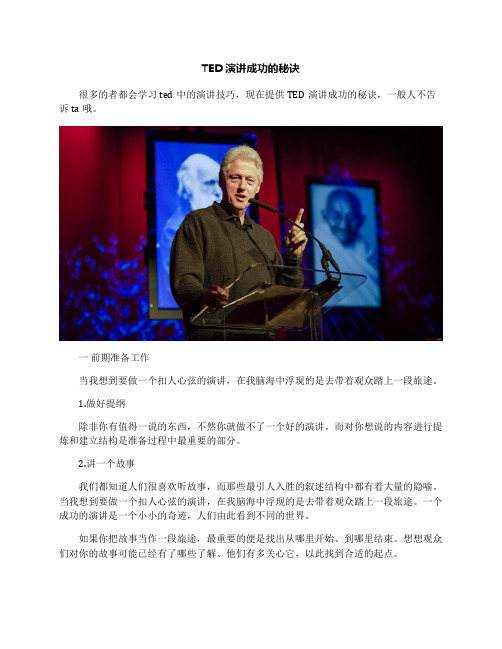
TED演讲成功的秘诀很多的者都会学习ted中的演讲技巧,现在提供TED演讲成功的秘诀,一般人不告诉ta哦。
一前期准备工作当我想到要做一个扣人心弦的演讲,在我脑海中浮现的是去带着观众踏上一段旅途。
1.做好提纲除非你有值得一说的东西,不然你就做不了一个好的演讲。
而对你想说的内容进行提炼和建立结构是准备过程中最重要的部分。
2.讲一个故事我们都知道人们很喜欢听故事,而那些最引人入胜的叙述结构中都有着大量的隐喻。
当我想到要做一个扣人心弦的演讲,在我脑海中浮现的是去带着观众踏上一段旅途。
一个成功的演讲是一个小小的奇迹,人们由此看到不同的世界。
如果你把故事当作一段旅途,最重要的便是找出从哪里开始、到哪里结束。
想想观众们对你的故事可能已经有了哪些了解、他们有多关心它,以此找到合适的起点。
最棒的演讲者会非常快速地介绍主题,解释他们自己为什么会对这个话题感兴趣,并说服观众相信他们也应该关注这个主题。
3.突出重点我在演讲者的初稿中发现的最大问题是会涵盖太多内容。
你无法在一个演讲中去概括整个行业。
如果你试图将你知道的所有东西都塞进演讲,那就没时间去举出关键的细节了,而且你的演讲会因各种抽象的语言而晦涩难懂,从而会导致本身就懂的人能听得懂,而之前不懂的人就不知所云了。
你需要举出具体的例子来使你的想法有血有肉,充实起来。
不要一心想把所有东西都纳入到一个短短的演讲。
相反地,要深入。
不要告诉我们你研究的整个领域,告诉我们你的独特贡献。
当然,过度阐述或者纠结于内容的意义也不可行。
对这种情况有另一套补救的方法。
记住,观众们很聪明。
让他们自己去找寻出一些意义,去各自归纳收获的结论。
4.营造悬念很多顶级的演讲具有着侦探小说般的叙事结构,演讲者引出问题开始演讲,然后介绍寻求解决方法的过程,直到恍然大悟的一刻,这时观众自会看到这一切叙述的意义。
如果一个演讲失败了,几乎都是因为讲者没有设计好整个故事,错误估计了观众的兴趣点,或者忽略了故事本身。
成功的八个秘诀8 secrets of success
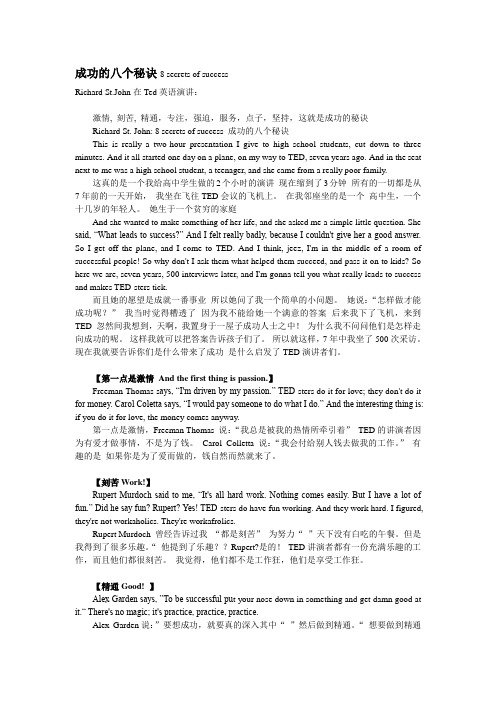
成功的八个秘诀8 secrets of successRichard St.John在Ted英语演讲:激情, 刻苦, 精通,专注,强迫,服务,点子,坚持,这就是成功的秘诀Richard St. John: 8 secrets of success 成功的八个秘诀This is really a two-hour presentation I give to high school students, cut down to three minutes. And it all started one day on a plane, on my way to TED, seven years ago. And in the seat next to me was a high school student, a teenager, and she came from a really poor family.这真的是一个我给高中学生做的2个小时的演讲现在缩到了3分钟所有的一切都是从7年前的一天开始,我坐在飞往TED会议的飞机上。
在我邻座坐的是一个高中生,一个十几岁的年轻人。
她生于一个贫穷的家庭And she wanted to make something of her life, and she asked me a simple little question. She said, “What leads to success?” And I felt really badly, because I couldn't give her a good answer. So I get off the plane, and I come to TED. And I think, jeez, I'm in the middle of a room of successful people! So why don't I ask them what helped them succeed, and pass it on to kids? So here we are, seven years, 500 interviews later, and I'm gonna tell you what really leads to success and makes TED-sters tick.而且她的愿望是成就一番事业所以她问了我一个简单的小问题。
TED英语演讲:成功的真实秘诀
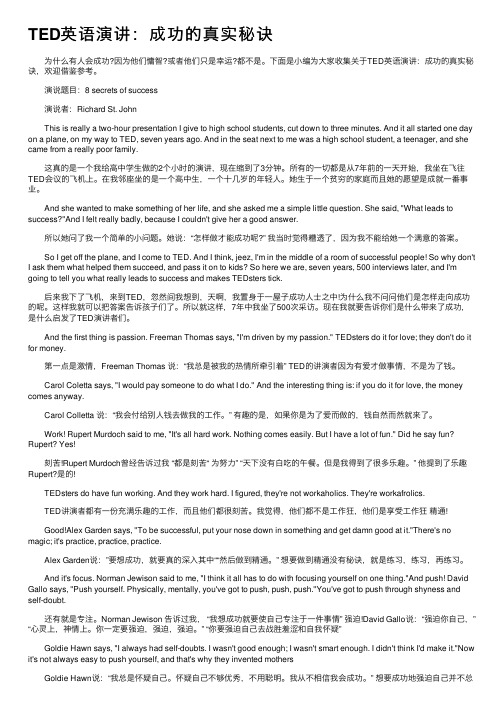
TED英语演讲:成功的真实秘诀 为什么有⼈会成功?因为他们慵智?或者他们只是幸运?都不是。
下⾯是⼩编为⼤家收集关于TED英语演讲:成功的真实秘诀,欢迎借鉴参考。
演说题⽬:8 secrets of success 演说者:Richard St. John This is really a two-hour presentation I give to high school students, cut down to three minutes. And it all started one day on a plane, on my way to TED, seven years ago. And in the seat next to me was a high school student, a teenager, and she came from a really poor family. 这真的是⼀个我给⾼中学⽣做的2个⼩时的演讲,现在缩到了3分钟。
所有的⼀切都是从7年前的⼀天开始,我坐在飞往TED会议的飞机上。
在我邻座坐的是⼀个⾼中⽣,⼀个⼗⼏岁的年轻⼈。
她⽣于⼀个贫穷的家庭⽽且她的愿望是成就⼀番事业。
And she wanted to make something of her life, and she asked me a simple little question. She said, "What leads to success?"And I felt really badly, because I couldn't give her a good answer. 所以她问了我⼀个简单的⼩问题。
她说:“怎样做才能成功呢?” 我当时觉得糟透了,因为我不能给她⼀个满意的答案。
So I get off the plane, and I come to TED. And I think, jeez, I'm in the middle of a room of successful people! So why don't I ask them what helped them succeed, and pass it on to kids? So here we are, seven years, 500 interviews later, and I'm going to tell you what really leads to success and makes TEDsters tick. 后来我下了飞机,来到TED,忽然间我想到,天啊,我置⾝于⼀屋⼦成功⼈⼠之中!为什么我不问问他们是怎样⾛向成功的呢。
ted演讲成功的秘诀

ted演讲成功的秘诀古往今来,成功始终是一个绕不开的话题,采撷成功的花朵,是芸芸众生共同的追求。
那么成功的秘诀是什么呢?以下是店铺分享的ted演讲成功的秘诀,一起来和小编看看吧。
ted演讲成功的秘诀在各项研究中,我的问题是谁才是成功者,为什么他们会成功?我和我的研究团队前往西点军校展开调研,我们试图预测哪些学员能够耐得住军队的训练,哪些会被淘汰出局。
我们前去观摩全国拼字比赛,同时也试着预测哪些孩子会晋级到最后的比赛。
我们研究,在恶劣的环境下工作的,刚入行的老师,询问他们哪些老师会在学年结束后继续留下来任教。
以及他们之中谁能最快地提高学生的学习成绩。
我们与私企合作,向他们询问哪些销售人员可以保住工作,哪些赚钱更多?In all those very different contexts, one characteristic emerged, as a s ignificant predictor of success, and it wasn’t social intelligence, it wasn’t good looks, physical health, and it wasn’t I.Q., it was grit. Grit is passion and perseverance for very long-term goals. Grit is having stamina, grit is sticking with your future, day in, day out. Not just for the week, not just for the month, but for years and working really hard to make that future a reality. Grit is living life like it’s a marathon, not a sprint. A few years ago, I started studying grit in the Chicago public schools. I asked thousands of high school junior to take grit questionnaires, and then waited around more than a year to see who would graduate, turns out that grittier kids were significantly more likely to graduate, even when I matched them on every characteristic I could measure, things like family incomes, standardized achievement test scores, even how safe kids felt when they were at school. So it’s not just at West Point or the National Spelling Bee that grit matters, it’s also in school, especially for kids at riskfor dropping out. To me, the most shocking thing about grit is how little we know, how little science knows about building it.在所有那些不同的环境下,一种性格特征凸显了出来,这种特征很大程度上预示了成功,而且他并不是社交智力,不是漂亮的外表,强健的体魄,也不是很高的I.Q.,它是毅力。
The Key to Success 成功的关键 TED演讲
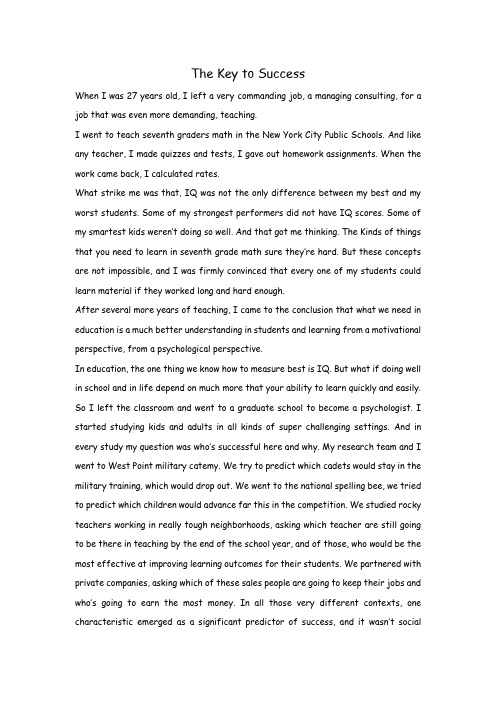
The Key to SuccessWhen I was 27 years old, I left a very commanding job, a managing consulting, for a job that was even more demanding, teaching.I went to teach seventh graders math in the New York City Public Schools. And like any teacher, I made quizzes and tests, I gave out homework assignments. When the work came back, I calculated rates.What strike me was that, IQ was not the only difference between my best and my worst students. Some of my strongest performers did not have IQ scores. Some of my smartest kids weren’t doing so well. And that got me thinking. The Kinds of things that you need to learn in seventh grade math sure they’re hard. But these concepts are not impossible, and I was firmly convinced that every one of my students could learn material if they worked long and hard enough.After several more years of teaching, I came to the conclusion that what we need in education is a much better understanding in students and learning from a motivational perspective, from a psychological perspective.In education, the one thing we know how to measure best is IQ. But what if doing well in school and in life depend on much more that your ability to learn quickly and easily. So I left the classroom and went to a graduate school to become a psychologist. I started studying kids and adults in all kinds of super challenging settings. And in every study my question was who’s successful here and why. My research team and I went to West Point military catemy. We try to predict which cadets would stay in the military training, which would drop out. We went to the national spelling bee, we tried to predict which children would advance far this in the competition. We studied rocky teachers working in really tough neighborhoods, asking which teacher are still going to be there in teaching by the end of the school year, and of those, who would be the most effective at improving learning outcomes for their students. We partnered with private companies, asking which of these sales people are going to keep their jobs and who’s going to earn the most money. In all those very different contexts, one characteristic emerged as a significant predictor of success, and it wasn’t socialintelligence, it wasn’t good looks, physical health and it wasn’t IQ. It was grit.Grit is passion and for very long-term goals. Grit is having . Grit is sticking with your future, day in, day out, not just for the week, not just for the month, but for years, and working really hard to make that future a reality. Grit is living a life like it’s a marathon, not a .A few years ago, I started studying grit in Chicago public schools. I asked thousands of high school juniors to take great questionnaires, and then waited around over a year to see who would graduate. Turns out that, grittier kids are significantly more likely to graduate, even when I matched them on every characteristic I could measure. Things like family income, standardized achievement tests scores even how save kids felt when they were at school. So it’s not that West Point or the national Spelling Bee that grit matters, it’s also in school, especially for kids at rates of dropping out. To me the most shocking thing about grit is that how little we know, how little science knows about building it. Every day parents and teachers asked me how do I build grit kids? What do I do to teach kid a solid work? How do I keep them motivated on the long run? The honest answer is, I don’t know. What I do know is that talent doesn’t make you gritty, our data show very clearly that there are many talented individuals who simply do not follow through on their commitments. In fact, in our data, girt is usually unrelated or even inversely related to measures of talent. So far the best answer of building grit in kids is something called growth mindset. This is an idea developed at Stanford University by, and it is the belief that the ability to learn is not fixed, that it can change with your effort. Doctor shows that when kids read and learned about the brain and how it changes and grows in response to challenge, they’re much likely to persevere when they fail. Because they don’t believe failure is a permanent condition. So growth mind sit is a great idea for building grit, but we need more and that’s why I’m going to end my remarks, because that’s where we are and that’s the world that stands before us. We need to take our best ideas, our strongest intuitions and we need to test them, we need to measure whether we have been successful and we have to be willing to fail, to be wrong, to start over again with the lessons learnt. In other words we need to be gritty ingetting our kids grittier.。
TED乔约翰成功的八个秘诀的演讲词5篇范文
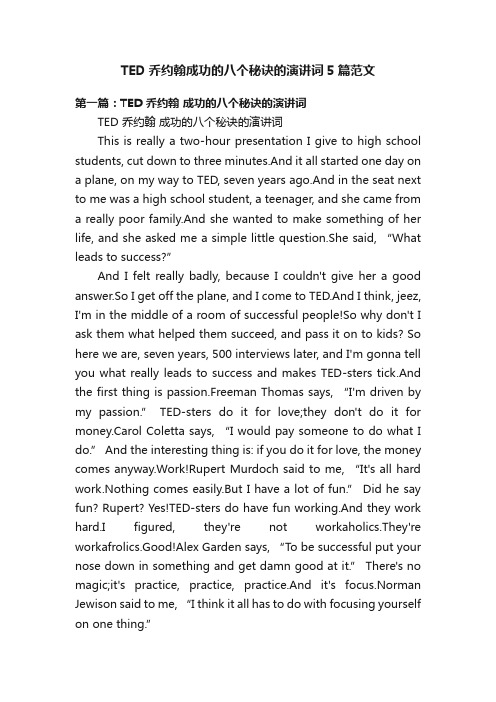
TED乔约翰成功的八个秘诀的演讲词5篇范文第一篇:TED 乔约翰成功的八个秘诀的演讲词TED 乔约翰成功的八个秘诀的演讲词This is really a two-hour presentation I give to high school students, cut down to three minutes.And it all started one day on a plane, on my way to TED, seven years ago.And in the seat next to me was a high school student, a teenager, and she came from a really poor family.And she wanted to make something of her life, and she asked me a simple little question.She said, “What leads to success?”And I felt really badly, because I couldn't give her a good answer.So I get off the plane, and I come to TED.And I think, jeez, I'm in the middle of a room of successful people!So why don't I ask them what helped them succeed, and pass it on to kids? So here we are, seven years, 500 interviews later, and I'm gonna tell you what really leads to success and makes TED-sters tick.And the first thing is passion.Freeman Thomas says, “I'm driven by my passion.” TED-sters do it for love;they don't do it for money.Carol Coletta says, “I would pay someone to do what I do.” And the interesting thing is: if you do it for love, the money comes anyway.Work!Rupert Murdoch said to me, “It's all hard work.Nothing comes easily.But I have a lot of fun.” Did he say fun? Rupert? Yes!TED-sters do have fun working.And they work hard.I figured, they're not workaholics.They're workafrolics.Good!Alex Garden says, “To be successful put your nose down in something and get damn good at it.” There's no magic;it's practice, practice, practice.And it's focus.Norman Jewison said to me, “I think it all has to do with focusing yourself on one thing.”And push!David Gallo says, “Push yourself.Physically, mentally, you've gotta push, push, push.” You gotta push through shyness and self-doubt.Goldie Hawn says, “I always had self-doubts.I wasn't good enough;I wasn't smart enough.I didn't think I'd make it.” No w it's not always easy to push yourself, and that's why they invented mothers.(Laughter)Frank Gehry--Frank Gehry said to me, “My mother pushed me.”Serve!Sherwin Nuland says, “It was a privilege to serve as a doctor.” Now a lot of kids tell me they want to be millionaires.And the first thing I say to them is: “OK, well you can't serve yourself;you gotta serve others something of value.Because that's the way people really get rich.”Ideas!TED-ster Bill Gates says, “I had an idea: founding the first micro-com puter software company.” I'd say it was a pretty good idea.And there's no magic to creativity in coming up with ideas--it's just doing some very simple things.And I give lots of evidence.Persist!Joe Kraus says, “Persistence is the number one reason for our success.” You gotta persist through failure.You gotta persist through crap!Which of course means “Criticism, Rejection, Assholes and Pressure.”(Laughter)So, the big--the answer to this question is simple: Pay 4,000 bucks and come to TED.Or failing that, do the eight things--and trust me, these are the big eight things that lead to success.Thank you TED-sters for all your interviews!第二篇:TED 乔约翰成功的八个秘诀的演讲词TED 乔约翰成功的八个秘诀的演讲词This is really a two-hour presentation I give to high school students, cut down to three minutes.And it all started one day on a plane, on my way to TED, seven years ago.And in the seat next to me was a high school student, a teenager, and she came froma really poor family.And she wanted to make something of her life, and she asked me a simple little question.She said, “What leads to success?”And I felt really badly, because I couldn't give her a good answer.So I get off the plane, and I come to TED.And I think, jeez, I'm in the middle of a room of successful people!So why don't I ask them what helped them succeed, and pass it on to kids? So here we are, seven years, 500 interviews later, and I'm gonna tell you what really leads to success and makes TED-sters tick.And the first thing is passion.Freeman Thomas says, “I'm driven by my pa ssion.” TED-sters do it for love;they don't do it for money.Carol Coletta says, “I would pay someone to do what I do.” And the interesting thing is: if you do it for love, the money comes anyway.Work!Rupert Murdoch said to me, “It's all hard work.Nothing c omes easily.But I have a lot of fun.” Did he say fun? Rupert? Yes!TED-sters do have fun working.And they work hard.I figured, they're not workaholics.They're workafrolics.Good!Alex Garden says, “To be successful put your nose down in something and get damn good at it.” There's no magic;it's practice, practice, practice.And it's focus.Norman Jewison said to me, “I think it all has to do with focusing yourself on one thing.”And push!David Gallo says, “Push yourself.Physically, mentally, you've gotta push, pu sh, push.” You gotta push through shyness and self-doubt.Goldie Hawn says, “I always had self-doubts.I wasn't good enough;I wasn't smart enough.I didn't think I'd make it.” Now it's not always easy to push yourself, and that's why they invented mothers.(Laughter)Frank Gehry--Frank Gehry said to me, “My mother pushed me.”Serve!Sherwin Nuland says, “It was a privilege to serve as a doctor.” Now a lotof kids tell me they want to be millionaires.And the first thing I say to them is: “OK, well you can't serve y ourself;you gotta serve others something of value.Because that's the way people really get rich.”Ideas!TED-ster Bill Gates says, “I had an idea: founding the first micro-computer software company.” I'd say it was a pretty good idea.And there's no magic to creativity in coming up with ideas--it's just doing some very simple things.And I give lots of evidence.Persist!Joe Kraus says, “Persistence is the number one reason for our success.” You gotta persist through failure.You gotta persist through crap!Which of course means “Criticism, Rejection, Assholes and Pressure.”(Laughter)So, the big--the answer to this question is simple: Pay 4,000 bucks and come to TED.Or failing that, do the eight things--and trust me, these are the big eight things that lead to success.Thank you TED-sters for all your interviews!第三篇:8-secrets-of-success 成功的八个秘诀Ted演讲台词Eight secrets of successRichard St.JohnThis is really a two-hour presentation I give to high school students, cut down to three minutes.And it all started one day on a plane, on my way to TED, seven years ago.And in the seat next to me was a high school student, a teenager, and she came from a really poor family.And she wanted to make something of her life, and she asked me a simple little question.She said, “What lea ds to success?” And I felt really badly, because I couldn't give her a good answer.So I get off the plane, and I come to TED.And I think, jeez, I'm in the middle of a room of successful people!So why don't I ask them what helped them succeed, and pass it on to kids? So here we are, seven years, 500 interviews later, and I'mgonna tell you what really leads to success and makes TED-sters tick.【And the first thing is passion.】Freeman Thomas says, “I'm driven by my passion.” TED-sters do it for love;they don't do it for money.Carol Coletta says, “I would pay someone to do what I do.” And the interesting thing is: if you do it for love, the money comes anyway.【Work!】Rupert Murdoch said to me, “It's all hard work.Nothing comes easily.But I have a lot of fun.” D id he say fun? Rupert? Yes!TED-sters do have fun working.And they work hard.I figured, they're not workaholics.They're workafrolics.【Good!】Alex Garden says, ”To be successful put your nose down in something and get damn good at it.“ There's no magic;it's practice, practice, practice.【And it's focus.】Norman Jewison said to me, ”I think it all has to do with focusing yourself on one thing.“【And push!】David Gallo says, ”Push yourself.Physically, mentally, you've gotta push, push, push.“ You gotta push thro ugh shyness and self-doubt.Goldie Hawn says, ”I always had self-doubts.I wasn't good enough;I wasn't smart enough.I didn't think I'd make it.“ Now it's not always easy to push yourself, and that's why they invented mothers.(Laughter)Frank Gehry — Frank Gehry said to me, ”My mother pushed me.“【Serve!】Sherwin Nuland says, ”It was a privilege to serve as a doctor.“ Now a lot of kids tell me they want to be millionaires.And the first thing I say to them is: ”OK, well you can't serve yourself;【Ideas!】TED-ste r Bill Gates says, ”I had an idea: founding the firstmicro-computer software company.“ I'd say it was a pretty good idea.And there's no magic to creativity in coming up with ideas —it's just doing some very simple things.And I give lots of evidence.【Persist!】Joe Kraus says, ”Persistence is the number one reason for our success.“ You gotta persist through failure.You gotta persist through crap!Which of course means ”Criticism, Rejection, Assholes and Pressure.“(Laughter)So, the big — the answer to this question is simple: Pay 4,000 bucks and come to TED.Or failing that, do the eight things — and trust me, these are the big eight things that lead to success.Thank you TED-sters for all your interviews!第四篇:乔吉拉德成功的秘诀乔吉拉德成功的秘诀1、记住:当你为失败悲哀的时候,不如立即行动起来。
TED演讲的演说成功之道_为人处世

TED演讲的演说成功之道一个人一旦把沟通能力练好了,说服能力练出来,演说能力练好了,对别人的影响力练出来,就化不可能为可能,变大地为黄金。
以下是小编为大家整理的关于TED演讲的演说之道,欢迎阅读!迄今为止,最受欢迎的TED演讲是肯·罗宾逊的“学校扼杀创造力”,这似乎有些出人意料。
这个关于教育改革的18分钟演讲为何能够获得超过1500万次的视频点击量?柯南·奥布莱恩(ConanO’Brien)、史蒂芬·科拜尔、J·K·罗琳(J.K.Rowling)和奥普拉·温弗瑞的名气都远大于罗宾逊,但在YouTube网站上,罗宾逊演讲的受欢迎程度却远远超过他们中的任何一位。
罗宾逊的演讲之所以广受欢迎,是因为人的大脑喜欢关注新奇的事物,喜欢幽默。
加入新奇和幽默的元素,你的演讲会增色不少。
罗宾逊用幽默的方式探讨了一个老生常谈的问题,即如何让孩子受到更好的教育。
“如果你参加一个晚宴,你说你是教育工作者—说实话,如果你真是教育工作者,你很少能有机会出席晚宴。
”罗宾逊开场时说道。
这时观众立刻大笑起来,没等观众恢复平静,他又抛出了一个笑话:“但是,如果你有这个机会,当别人问‘你是做什么的?’而你回答自己是教育工作者时,你会看到他们涨红了脸,好像在说‘天啊,怎么让我碰上了,我一个星期才出来一次啊’。
”肯·罗宾逊巧妙地把逸事、故事和幽默融入自己的演讲,以此凸显他的主要观点:美国教育体系的问题在于,它鼓励学生接受应试教育,却扼杀了学生的创造力、冒险精神和创新意识。
罗宾逊的演讲在给观众带来欢乐的同时,还引发了他们的思考。
以下列举几例。
“我最近听到一个很不错的故事—我很愿意讲讲这个故事—它说的是一个小女孩正在上画画课。
这个小女孩6岁,她坐在教室后排画画,而老师说她上课几乎从不注意听讲,但在画画课上她却听得很认真,老师饶有兴趣地走过去问她:‘你在画什么?’小女孩回答:‘我在画上帝。
The Key to Success 成功的关键 TED演讲

The Key to SuccessWhen I was 27 years old, I left a very commanding job, a managing consulting, for a job that was even more demanding, teaching.I went to teach seventh graders math in the New York City Public Schools. And like any teacher, I made quizzes and tests, I gave out homework assignments. When the work came back, I calculated rates.What strike me was that, IQ was not the only difference between my best and my worst students. Some of my strongest performers did not have IQ scores. Some of my smartest kids weren’t doing so well. And that got me thinking. The Kinds of things that you need to learn in seventh grade math sure they’re hard. But these concepts are not impossible, and I was firmly convinced that every one of my students could learn material if they worked long and hard enough.After several more years of teaching, I came to the conclusion that what we need in education is a much better understanding in students and learning from a motivational perspective, from a psychological perspective.In education, the one thing we know how to measure best is IQ. But what if doing well in school and in life depend on much more that your ability to learn quickly and easily. So I left the classroom and went to a graduate school to become a psychologist. I started studying kids and adults in all kinds of super challenging settings. And in every study my question was who’s successful here and why. My research team and I went to West Point military catemy. We try to predict which cadets would stay in the military training, which would drop out. We went to the national spelling bee, we tried to predict which children would advance far this in the competition. We studied rocky teachers working in really tough neighborhoods, asking which teacher are still going to be there in teaching by the end of the school year, and of those, who would be the most effective at improving learning outcomes for their students. We partnered with private companies, asking which of these sales people are going to keep their jobs and who’s going to earn the most money. In all those very different contexts, one characteristic emerged as a significant predictor of success, and it wasn’t socialintelligence, it wasn’t good looks, physical health and it wasn’t IQ. It was grit.Grit is passion and for very long-term goals. Grit is having . Grit is sticking with your future, day in, day out, not just for the week, not just for the month, but for years, and working really hard to make that future a reality. Grit is living a life like it’s a marathon, not a .A few years ago, I started studying grit in Chicago public schools. I asked thousands of high school juniors to take great questionnaires, and then waited around over a year to see who would graduate. Turns out that, grittier kids are significantly more likely to graduate, even when I matched them on every characteristic I could measure. Things like family income, standardized achievement tests scores even how save kids felt when they were at school. So it’s not that West Point or the national Spelling Bee that grit matters, it’s also in school, especially for kids at rates of dropping out. To me the most shocking thing about grit is that how little we know, how little science knows about building it. Every day parents and teachers asked me how do I build grit kids? What do I do to teach kid a solid work? How do I keep them motivated on the long run? The honest answer is, I don’t know. What I do know is that talent doesn’t make you gritty, our data show very clearly that there are many talented individuals who simply do not follow through on their commitments. In fact, in our data, girt is usually unrelated or even inversely related to measures of talent. So far the best answer of building grit in kids is something called growth mindset. This is an idea developed at Stanford University by, and it is the belief that the ability to learn is not fixed, that it can change with your effort. Doctor shows that when kids read and learned about the brain and how it changes and grows in response to challenge, they’re much likely to persevere when they fail. Because they don’t believe failure is a permanent condition. So growth mind sit is a great idea for building grit, but we need more and that’s why I’m going to end my remarks, because that’s where we are and that’s the world that stands before us. We need to take our best ideas, our strongest intuitions and we need to test them, we need to measure whether we have been successful and we have to be willing to fail, to be wrong, to start over again with the lessons learnt. In other words we need to be gritty ingetting our kids grittier.。
- 1、下载文档前请自行甄别文档内容的完整性,平台不提供额外的编辑、内容补充、找答案等附加服务。
- 2、"仅部分预览"的文档,不可在线预览部分如存在完整性等问题,可反馈申请退款(可完整预览的文档不适用该条件!)。
- 3、如文档侵犯您的权益,请联系客服反馈,我们会尽快为您处理(人工客服工作时间:9:00-18:30)。
成功的钥匙When I was 27 years old, I left a very demanding job in management consulting, for a job that was even more demanding: teaching. I went to teach seventh grades math in the New York City public schools. And like any teacher, I made quizzes and tests, i gave out homework assignments. When the work came back, I calculated grades. What struck me was that I.Q. was not the only difference between my best and my worst students, some of my strongest performers did not have stratospheric I.Q. Scores, some of my smartest kids weren’t doing so well. And that got me thinking, the kinds of things you need to learn in seventh grade math, sure, they’re hard: ratios, decimals, the area of a parallelogram, but these concepts are not impossible. And I was firmly convinced that every one of my students could learn material if they worked hard and long enough。
在我 27岁的时候,我辞去了一份非常有挑战性的职业 -企业管理咨询,转而投入了一份更加具有挑战性的职业:教育。
我来到纽约的一些公立学校教七年级学生数学, 和别的老师一样, 我会给同学们做小测试和考试, 我会给他们布置家庭作业。
当这些试卷和作业收上来之后,我计算了他们的成绩,让我震惊的是, I.Q 的高低并不是我最好的和最差的学生之间唯一的差别,一些在课业上表现很好的学生并不具有非常高的 IQ 分数, 一些聪明的孩子反而在课业上表现的不那么尽如人意,这引起了我的思考。
当然,学生们在七年级需要学习的东西,是有难度的,像比率,小数,平行四边形的面积计算,但是这些概念是完全可以掌握的, 我坚信我的每一位学生都可以学会教材内容, 只要他们肯花时间和精力的话。
After several more years of teaching, I came to the conclusion that what we need in education is a much better understanding of students and learning from a motivational perspective, from a psychological perspective. In education, the one thing we know how to measure best is I.Q., but what if doing well in school and in life, depends on much more than your ability to learn quickly and easily? So I left classroom, and I went to graduate school to become a psychologist. I started studying kids and adults in all kinds of super challenging settings, and in every study my question was who is successful hereand why. My research team and I went to West Point Military Academy, we try to predict which cadets would stay in military training and which would drop out. We went to the National Spelling Bee, and tried to predict which children would advance farthest in competition. We studied rookie teachers in really tough neighborhoods, asking which teachers are still going to be here in teaching by the end of the school year. And of those, who will be the most effective at improving learning outcomes for their students. We partnered with private companies, asking which of these salespeople is going to keep their jobs, and who’s going to earn the most money?经过几年教学之后, 我得出一个结论, 我们在教育方面需要做的是从学习动力的角度和心理学的角度对学生和学习行为, 进行一次更为深刻的理解。
在教育系统中,我们都知道评价优秀学生的标准就是 IQ ,但如果在学校和生活中的优秀表现远不仅仅依赖于你轻松高效的学习能力呢?所以我离开了讲台, 回到学校继续心理学硕士学位。
我开始研究, 孩子和大人在各种具有挑战性的情况下以及在各项研究中, 我的问题是谁才是成功者, 为什么他们会成功?我和我的研究团队前往西点军校展开调研, 我们试图预测哪些学员能够耐得住军队的训练, 哪些会被淘汰出局。
我们前去观摩全国拼字比赛, 同时也试着预测哪些孩子会晋级到最后的比赛。
我们研究,在恶劣的环境下工作的,刚入行的老师,询问他们哪些老师会在学年结束后继续留下来任教。
以及他们之中谁能最快地提高学生的学习成绩。
我们与私企合作, 向他们询问哪些销售人员可以保住工作, 哪些赚钱更多? In all those very different contexts, one characteristic emerged, as a significant predictor of success, and it wasn’t social intelligence, it wasn’t good looks, physical health, and it wasn’t I.Q. , it was grit. Grit is passion and perseverance for very long-term goals. Grit is having stamina, grit is sticking with your future, day in, day out. Not just for the week, not just for the month, but for years and working really hard to make that future a reality. Grit is living life like it’s a marathon, not a sprint. A few years ago, I started studying grit in the Chicago public schools. I asked thousands of high school junior to take grit questionnaires, and then waited around more than a year to see who would graduate,turns out that grittier kids were significantly more likely to graduate, even when I matched them on every characteristic I could measure, things like family incomes, standardized achievement test scores, even how safe kids felt when they were at school. So it’s not just at West Point or the National Spelling Bee that grit matters, it’s also in school, especially for kids at risk for dropping out. To me, the most shocking thing about grit is how little we know, how little science knows about building it.在所有那些不同的环境下, 一种性格特征凸显了出来, 这种特征很大程度上预示了成功,而且他并不是社交智力,不是漂亮的外表,强健的体魄,也不是很高的 I.Q. , 它是毅力。
毅力是对长远目标的激情和坚持, 毅力是拥有持久的恒劲, 毅力是你对未来的坚持, 日复一日, 不是仅仅持续一个星期或者一个月, 而是几年甚至几十年努力奋斗着, 让自己的梦想变为现实。
毅力把生活当成一场马拉松而不是一场短跑。
几年前, 在芝加哥的公立学校里开始研究毅力, 我对上千名初中生进行了关于毅力的问卷调查, 然后等候了一年多来看最终哪些学生能毕业结果证明那些更具毅力的学生在毕业的概率上占绝对优势, 即使是在同样可以量化的外在因素下, 像家庭收入, 标准化成绩测验的分数, 甚至是孩子们在学校能获得多少安全感之类, 仍是有毅力的学生更容易毕业, 所有不仅仅是在西点军校里或者全国拼字比赛上才需要毅力, 在学校亦是如此, 尤其是对于那些徘徊在辍学边缘的孩子们。
